Exploring Cultural Diversity's Impact on Australian Healthcare
VerifiedAdded on 2022/11/15
|6
|1718
|274
Essay
AI Summary
This essay explores the crucial role of cultural diversity in the Australian healthcare setting. It defines cultural diversity and its significance in respecting the values, beliefs, and traditions of diverse populations, including Aboriginal and Torres Strait Islanders, refugees, and multicultural groups. The essay highlights how cultural diversity enhances patient care, communication, and health outcomes, emphasizing the need for culturally competent healthcare professionals. It discusses the challenges of linguistic differences and the importance of culturally sensitive communication to avoid adverse clinical events and medication errors. The essay also examines the implementation of culturally sensitive programs, staff training, and workplace standards to improve cultural competence and patient safety, particularly for vulnerable groups. It concludes that cultural diversity is essential for providing equitable and high-quality healthcare services in Australia, fostering better patient-provider relationships and improved health outcomes.
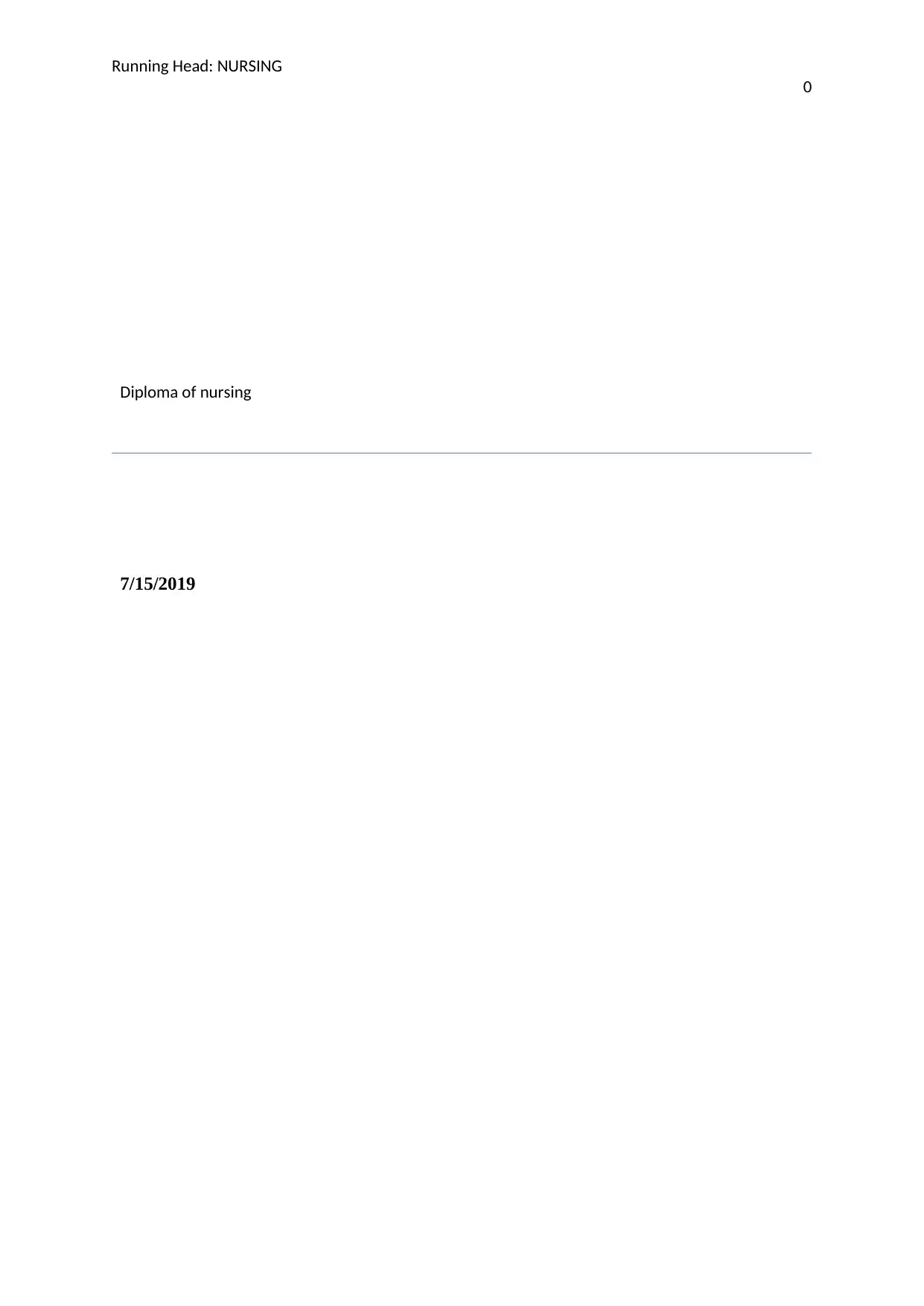
Running Head: NURSING
0
Diploma of nursing
7/15/2019
0
Diploma of nursing
7/15/2019
Paraphrase This Document
Need a fresh take? Get an instant paraphrase of this document with our AI Paraphraser
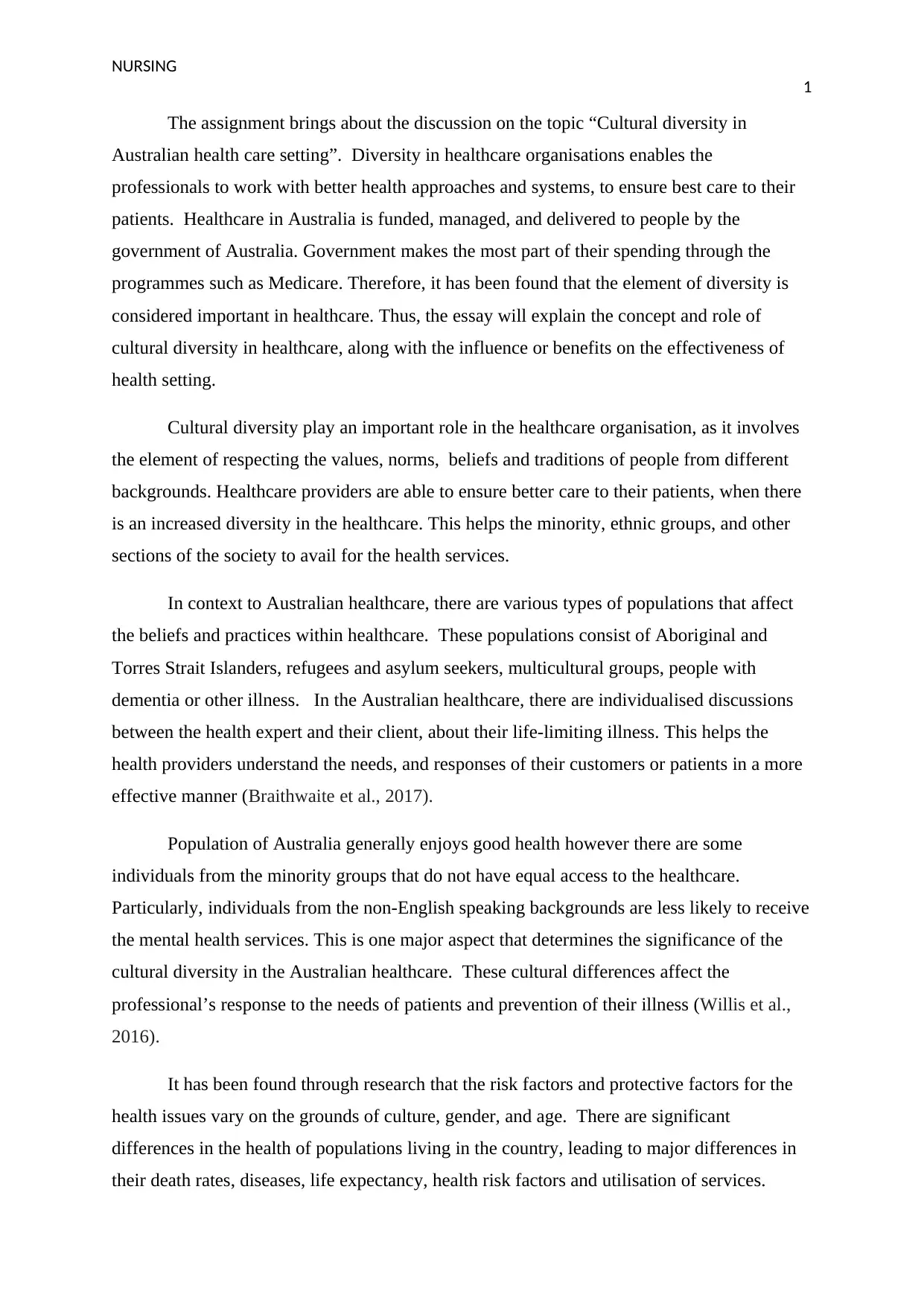
NURSING
1
The assignment brings about the discussion on the topic “Cultural diversity in
Australian health care setting”. Diversity in healthcare organisations enables the
professionals to work with better health approaches and systems, to ensure best care to their
patients. Healthcare in Australia is funded, managed, and delivered to people by the
government of Australia. Government makes the most part of their spending through the
programmes such as Medicare. Therefore, it has been found that the element of diversity is
considered important in healthcare. Thus, the essay will explain the concept and role of
cultural diversity in healthcare, along with the influence or benefits on the effectiveness of
health setting.
Cultural diversity play an important role in the healthcare organisation, as it involves
the element of respecting the values, norms, beliefs and traditions of people from different
backgrounds. Healthcare providers are able to ensure better care to their patients, when there
is an increased diversity in the healthcare. This helps the minority, ethnic groups, and other
sections of the society to avail for the health services.
In context to Australian healthcare, there are various types of populations that affect
the beliefs and practices within healthcare. These populations consist of Aboriginal and
Torres Strait Islanders, refugees and asylum seekers, multicultural groups, people with
dementia or other illness. In the Australian healthcare, there are individualised discussions
between the health expert and their client, about their life-limiting illness. This helps the
health providers understand the needs, and responses of their customers or patients in a more
effective manner (Braithwaite et al., 2017).
Population of Australia generally enjoys good health however there are some
individuals from the minority groups that do not have equal access to the healthcare.
Particularly, individuals from the non-English speaking backgrounds are less likely to receive
the mental health services. This is one major aspect that determines the significance of the
cultural diversity in the Australian healthcare. These cultural differences affect the
professional’s response to the needs of patients and prevention of their illness (Willis et al.,
2016).
It has been found through research that the risk factors and protective factors for the
health issues vary on the grounds of culture, gender, and age. There are significant
differences in the health of populations living in the country, leading to major differences in
their death rates, diseases, life expectancy, health risk factors and utilisation of services.
1
The assignment brings about the discussion on the topic “Cultural diversity in
Australian health care setting”. Diversity in healthcare organisations enables the
professionals to work with better health approaches and systems, to ensure best care to their
patients. Healthcare in Australia is funded, managed, and delivered to people by the
government of Australia. Government makes the most part of their spending through the
programmes such as Medicare. Therefore, it has been found that the element of diversity is
considered important in healthcare. Thus, the essay will explain the concept and role of
cultural diversity in healthcare, along with the influence or benefits on the effectiveness of
health setting.
Cultural diversity play an important role in the healthcare organisation, as it involves
the element of respecting the values, norms, beliefs and traditions of people from different
backgrounds. Healthcare providers are able to ensure better care to their patients, when there
is an increased diversity in the healthcare. This helps the minority, ethnic groups, and other
sections of the society to avail for the health services.
In context to Australian healthcare, there are various types of populations that affect
the beliefs and practices within healthcare. These populations consist of Aboriginal and
Torres Strait Islanders, refugees and asylum seekers, multicultural groups, people with
dementia or other illness. In the Australian healthcare, there are individualised discussions
between the health expert and their client, about their life-limiting illness. This helps the
health providers understand the needs, and responses of their customers or patients in a more
effective manner (Braithwaite et al., 2017).
Population of Australia generally enjoys good health however there are some
individuals from the minority groups that do not have equal access to the healthcare.
Particularly, individuals from the non-English speaking backgrounds are less likely to receive
the mental health services. This is one major aspect that determines the significance of the
cultural diversity in the Australian healthcare. These cultural differences affect the
professional’s response to the needs of patients and prevention of their illness (Willis et al.,
2016).
It has been found through research that the risk factors and protective factors for the
health issues vary on the grounds of culture, gender, and age. There are significant
differences in the health of populations living in the country, leading to major differences in
their death rates, diseases, life expectancy, health risk factors and utilisation of services.
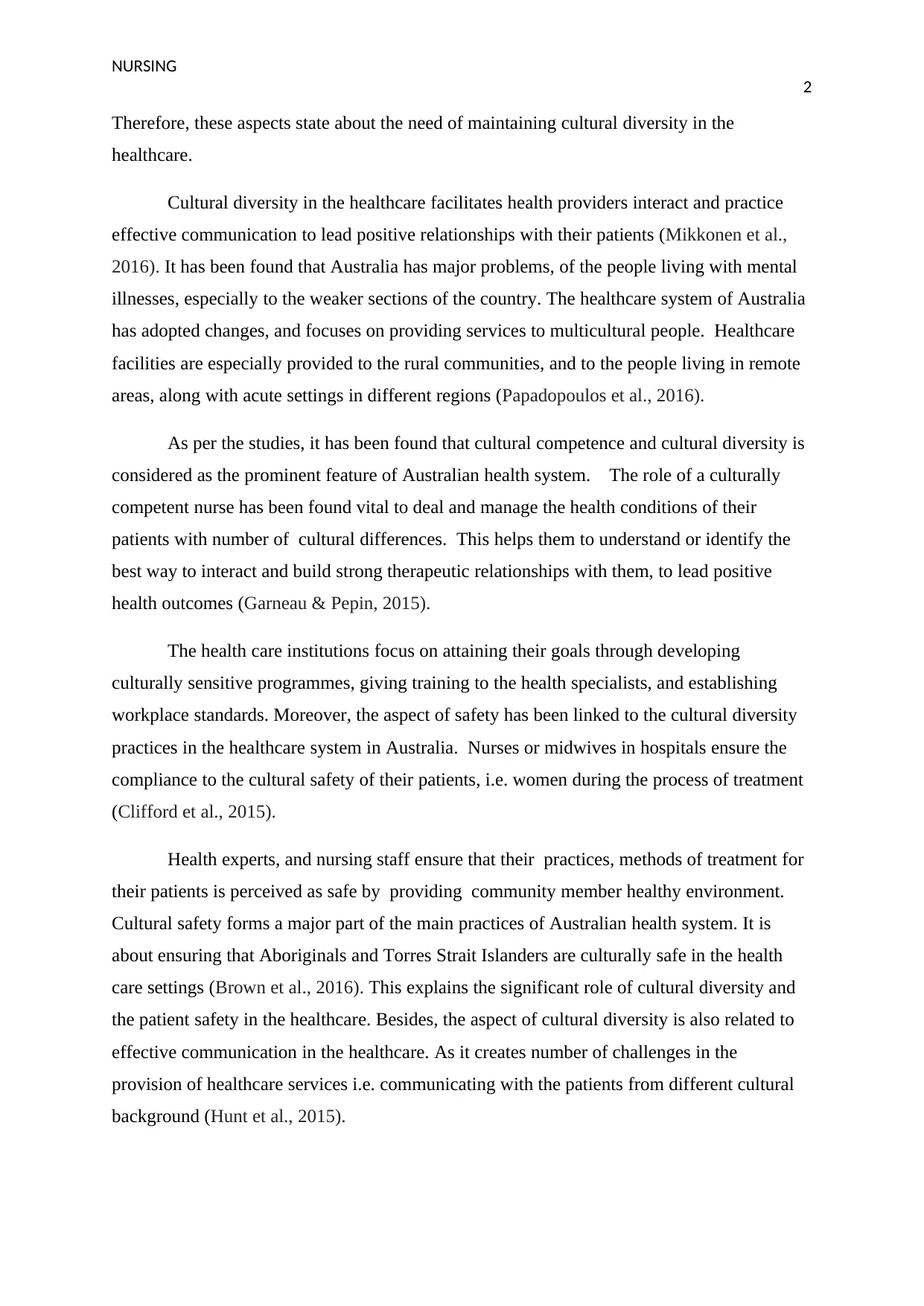
NURSING
2
Therefore, these aspects state about the need of maintaining cultural diversity in the
healthcare.
Cultural diversity in the healthcare facilitates health providers interact and practice
effective communication to lead positive relationships with their patients (Mikkonen et al.,
2016). It has been found that Australia has major problems, of the people living with mental
illnesses, especially to the weaker sections of the country. The healthcare system of Australia
has adopted changes, and focuses on providing services to multicultural people. Healthcare
facilities are especially provided to the rural communities, and to the people living in remote
areas, along with acute settings in different regions (Papadopoulos et al., 2016).
As per the studies, it has been found that cultural competence and cultural diversity is
considered as the prominent feature of Australian health system. The role of a culturally
competent nurse has been found vital to deal and manage the health conditions of their
patients with number of cultural differences. This helps them to understand or identify the
best way to interact and build strong therapeutic relationships with them, to lead positive
health outcomes (Garneau & Pepin, 2015).
The health care institutions focus on attaining their goals through developing
culturally sensitive programmes, giving training to the health specialists, and establishing
workplace standards. Moreover, the aspect of safety has been linked to the cultural diversity
practices in the healthcare system in Australia. Nurses or midwives in hospitals ensure the
compliance to the cultural safety of their patients, i.e. women during the process of treatment
(Clifford et al., 2015).
Health experts, and nursing staff ensure that their practices, methods of treatment for
their patients is perceived as safe by providing community member healthy environment.
Cultural safety forms a major part of the main practices of Australian health system. It is
about ensuring that Aboriginals and Torres Strait Islanders are culturally safe in the health
care settings (Brown et al., 2016). This explains the significant role of cultural diversity and
the patient safety in the healthcare. Besides, the aspect of cultural diversity is also related to
effective communication in the healthcare. As it creates number of challenges in the
provision of healthcare services i.e. communicating with the patients from different cultural
background (Hunt et al., 2015).
2
Therefore, these aspects state about the need of maintaining cultural diversity in the
healthcare.
Cultural diversity in the healthcare facilitates health providers interact and practice
effective communication to lead positive relationships with their patients (Mikkonen et al.,
2016). It has been found that Australia has major problems, of the people living with mental
illnesses, especially to the weaker sections of the country. The healthcare system of Australia
has adopted changes, and focuses on providing services to multicultural people. Healthcare
facilities are especially provided to the rural communities, and to the people living in remote
areas, along with acute settings in different regions (Papadopoulos et al., 2016).
As per the studies, it has been found that cultural competence and cultural diversity is
considered as the prominent feature of Australian health system. The role of a culturally
competent nurse has been found vital to deal and manage the health conditions of their
patients with number of cultural differences. This helps them to understand or identify the
best way to interact and build strong therapeutic relationships with them, to lead positive
health outcomes (Garneau & Pepin, 2015).
The health care institutions focus on attaining their goals through developing
culturally sensitive programmes, giving training to the health specialists, and establishing
workplace standards. Moreover, the aspect of safety has been linked to the cultural diversity
practices in the healthcare system in Australia. Nurses or midwives in hospitals ensure the
compliance to the cultural safety of their patients, i.e. women during the process of treatment
(Clifford et al., 2015).
Health experts, and nursing staff ensure that their practices, methods of treatment for
their patients is perceived as safe by providing community member healthy environment.
Cultural safety forms a major part of the main practices of Australian health system. It is
about ensuring that Aboriginals and Torres Strait Islanders are culturally safe in the health
care settings (Brown et al., 2016). This explains the significant role of cultural diversity and
the patient safety in the healthcare. Besides, the aspect of cultural diversity is also related to
effective communication in the healthcare. As it creates number of challenges in the
provision of healthcare services i.e. communicating with the patients from different cultural
background (Hunt et al., 2015).
⊘ This is a preview!⊘
Do you want full access?
Subscribe today to unlock all pages.

Trusted by 1+ million students worldwide
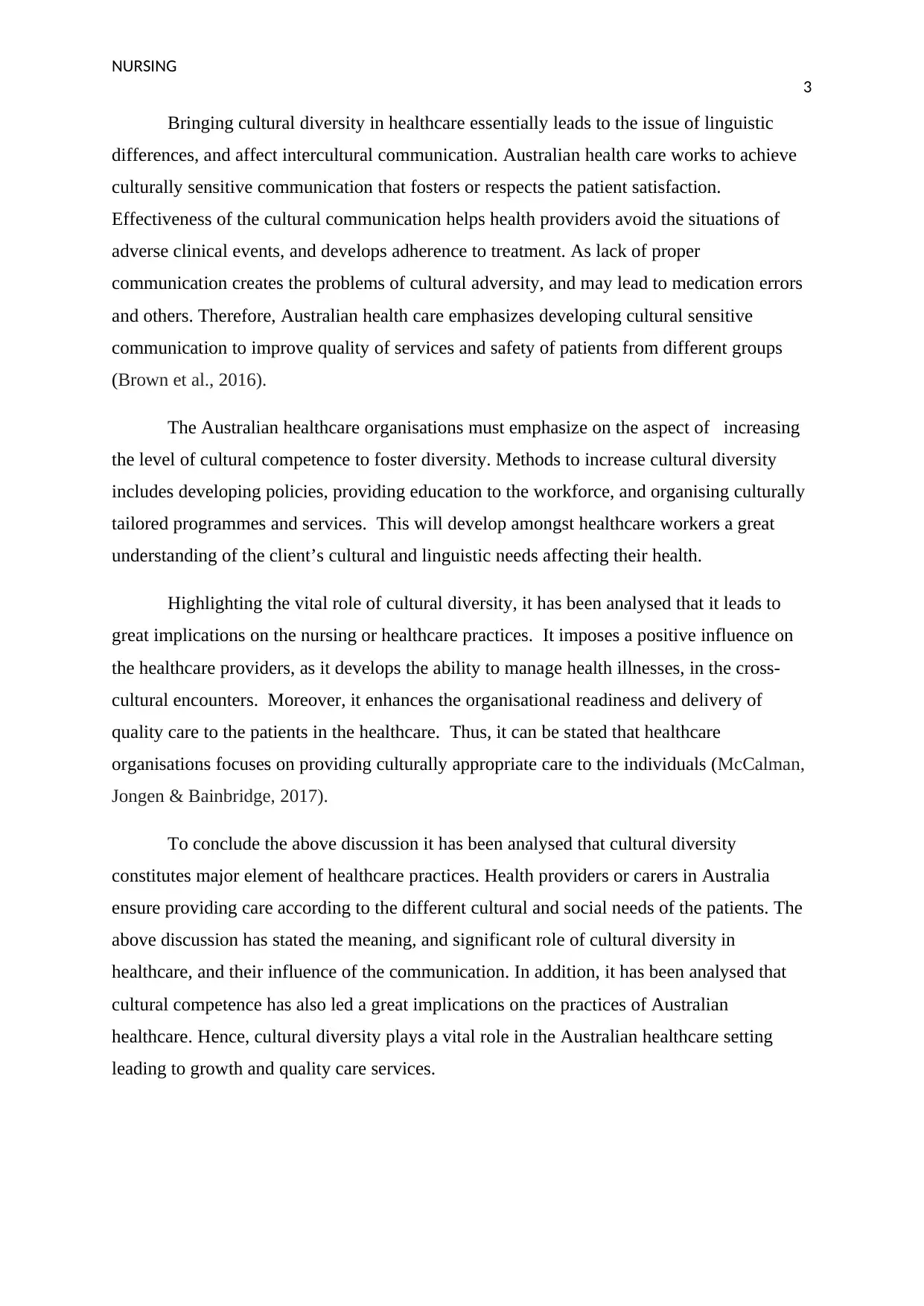
NURSING
3
Bringing cultural diversity in healthcare essentially leads to the issue of linguistic
differences, and affect intercultural communication. Australian health care works to achieve
culturally sensitive communication that fosters or respects the patient satisfaction.
Effectiveness of the cultural communication helps health providers avoid the situations of
adverse clinical events, and develops adherence to treatment. As lack of proper
communication creates the problems of cultural adversity, and may lead to medication errors
and others. Therefore, Australian health care emphasizes developing cultural sensitive
communication to improve quality of services and safety of patients from different groups
(Brown et al., 2016).
The Australian healthcare organisations must emphasize on the aspect of increasing
the level of cultural competence to foster diversity. Methods to increase cultural diversity
includes developing policies, providing education to the workforce, and organising culturally
tailored programmes and services. This will develop amongst healthcare workers a great
understanding of the client’s cultural and linguistic needs affecting their health.
Highlighting the vital role of cultural diversity, it has been analysed that it leads to
great implications on the nursing or healthcare practices. It imposes a positive influence on
the healthcare providers, as it develops the ability to manage health illnesses, in the cross-
cultural encounters. Moreover, it enhances the organisational readiness and delivery of
quality care to the patients in the healthcare. Thus, it can be stated that healthcare
organisations focuses on providing culturally appropriate care to the individuals (McCalman,
Jongen & Bainbridge, 2017).
To conclude the above discussion it has been analysed that cultural diversity
constitutes major element of healthcare practices. Health providers or carers in Australia
ensure providing care according to the different cultural and social needs of the patients. The
above discussion has stated the meaning, and significant role of cultural diversity in
healthcare, and their influence of the communication. In addition, it has been analysed that
cultural competence has also led a great implications on the practices of Australian
healthcare. Hence, cultural diversity plays a vital role in the Australian healthcare setting
leading to growth and quality care services.
3
Bringing cultural diversity in healthcare essentially leads to the issue of linguistic
differences, and affect intercultural communication. Australian health care works to achieve
culturally sensitive communication that fosters or respects the patient satisfaction.
Effectiveness of the cultural communication helps health providers avoid the situations of
adverse clinical events, and develops adherence to treatment. As lack of proper
communication creates the problems of cultural adversity, and may lead to medication errors
and others. Therefore, Australian health care emphasizes developing cultural sensitive
communication to improve quality of services and safety of patients from different groups
(Brown et al., 2016).
The Australian healthcare organisations must emphasize on the aspect of increasing
the level of cultural competence to foster diversity. Methods to increase cultural diversity
includes developing policies, providing education to the workforce, and organising culturally
tailored programmes and services. This will develop amongst healthcare workers a great
understanding of the client’s cultural and linguistic needs affecting their health.
Highlighting the vital role of cultural diversity, it has been analysed that it leads to
great implications on the nursing or healthcare practices. It imposes a positive influence on
the healthcare providers, as it develops the ability to manage health illnesses, in the cross-
cultural encounters. Moreover, it enhances the organisational readiness and delivery of
quality care to the patients in the healthcare. Thus, it can be stated that healthcare
organisations focuses on providing culturally appropriate care to the individuals (McCalman,
Jongen & Bainbridge, 2017).
To conclude the above discussion it has been analysed that cultural diversity
constitutes major element of healthcare practices. Health providers or carers in Australia
ensure providing care according to the different cultural and social needs of the patients. The
above discussion has stated the meaning, and significant role of cultural diversity in
healthcare, and their influence of the communication. In addition, it has been analysed that
cultural competence has also led a great implications on the practices of Australian
healthcare. Hence, cultural diversity plays a vital role in the Australian healthcare setting
leading to growth and quality care services.
Paraphrase This Document
Need a fresh take? Get an instant paraphrase of this document with our AI Paraphraser
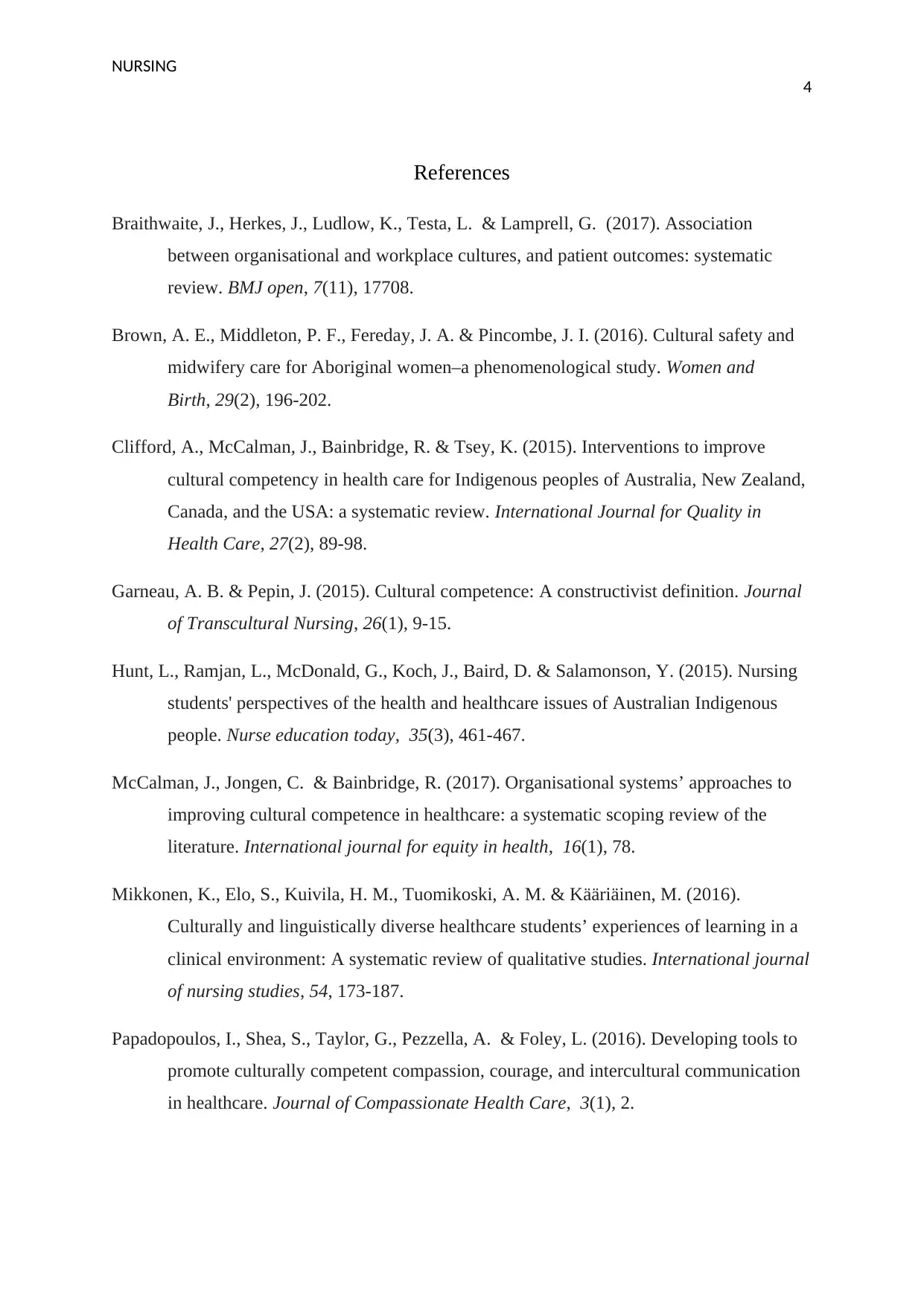
NURSING
4
References
Braithwaite, J., Herkes, J., Ludlow, K., Testa, L. & Lamprell, G. (2017). Association
between organisational and workplace cultures, and patient outcomes: systematic
review. BMJ open, 7(11), 17708.
Brown, A. E., Middleton, P. F., Fereday, J. A. & Pincombe, J. I. (2016). Cultural safety and
midwifery care for Aboriginal women–a phenomenological study. Women and
Birth, 29(2), 196-202.
Clifford, A., McCalman, J., Bainbridge, R. & Tsey, K. (2015). Interventions to improve
cultural competency in health care for Indigenous peoples of Australia, New Zealand,
Canada, and the USA: a systematic review. International Journal for Quality in
Health Care, 27(2), 89-98.
Garneau, A. B. & Pepin, J. (2015). Cultural competence: A constructivist definition. Journal
of Transcultural Nursing, 26(1), 9-15.
Hunt, L., Ramjan, L., McDonald, G., Koch, J., Baird, D. & Salamonson, Y. (2015). Nursing
students' perspectives of the health and healthcare issues of Australian Indigenous
people. Nurse education today, 35(3), 461-467.
McCalman, J., Jongen, C. & Bainbridge, R. (2017). Organisational systems’ approaches to
improving cultural competence in healthcare: a systematic scoping review of the
literature. International journal for equity in health, 16(1), 78.
Mikkonen, K., Elo, S., Kuivila, H. M., Tuomikoski, A. M. & Kääriäinen, M. (2016).
Culturally and linguistically diverse healthcare students’ experiences of learning in a
clinical environment: A systematic review of qualitative studies. International journal
of nursing studies, 54, 173-187.
Papadopoulos, I., Shea, S., Taylor, G., Pezzella, A. & Foley, L. (2016). Developing tools to
promote culturally competent compassion, courage, and intercultural communication
in healthcare. Journal of Compassionate Health Care, 3(1), 2.
4
References
Braithwaite, J., Herkes, J., Ludlow, K., Testa, L. & Lamprell, G. (2017). Association
between organisational and workplace cultures, and patient outcomes: systematic
review. BMJ open, 7(11), 17708.
Brown, A. E., Middleton, P. F., Fereday, J. A. & Pincombe, J. I. (2016). Cultural safety and
midwifery care for Aboriginal women–a phenomenological study. Women and
Birth, 29(2), 196-202.
Clifford, A., McCalman, J., Bainbridge, R. & Tsey, K. (2015). Interventions to improve
cultural competency in health care for Indigenous peoples of Australia, New Zealand,
Canada, and the USA: a systematic review. International Journal for Quality in
Health Care, 27(2), 89-98.
Garneau, A. B. & Pepin, J. (2015). Cultural competence: A constructivist definition. Journal
of Transcultural Nursing, 26(1), 9-15.
Hunt, L., Ramjan, L., McDonald, G., Koch, J., Baird, D. & Salamonson, Y. (2015). Nursing
students' perspectives of the health and healthcare issues of Australian Indigenous
people. Nurse education today, 35(3), 461-467.
McCalman, J., Jongen, C. & Bainbridge, R. (2017). Organisational systems’ approaches to
improving cultural competence in healthcare: a systematic scoping review of the
literature. International journal for equity in health, 16(1), 78.
Mikkonen, K., Elo, S., Kuivila, H. M., Tuomikoski, A. M. & Kääriäinen, M. (2016).
Culturally and linguistically diverse healthcare students’ experiences of learning in a
clinical environment: A systematic review of qualitative studies. International journal
of nursing studies, 54, 173-187.
Papadopoulos, I., Shea, S., Taylor, G., Pezzella, A. & Foley, L. (2016). Developing tools to
promote culturally competent compassion, courage, and intercultural communication
in healthcare. Journal of Compassionate Health Care, 3(1), 2.

NURSING
5
Willis, C. D., Saul, J., Bevan, H., Scheirer, M. A., Best, A., Greenhalgh, T. & Bitz, J. (2016).
Sustaining organizational culture change in health systems. Journal of health
organization and management, 30(1), 2-30.
5
Willis, C. D., Saul, J., Bevan, H., Scheirer, M. A., Best, A., Greenhalgh, T. & Bitz, J. (2016).
Sustaining organizational culture change in health systems. Journal of health
organization and management, 30(1), 2-30.
⊘ This is a preview!⊘
Do you want full access?
Subscribe today to unlock all pages.

Trusted by 1+ million students worldwide
1 out of 6
Related Documents
Your All-in-One AI-Powered Toolkit for Academic Success.
+13062052269
info@desklib.com
Available 24*7 on WhatsApp / Email
![[object Object]](/_next/static/media/star-bottom.7253800d.svg)
Unlock your academic potential
Copyright © 2020–2026 A2Z Services. All Rights Reserved. Developed and managed by ZUCOL.





